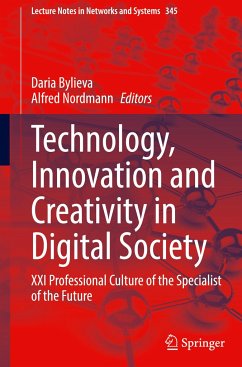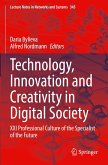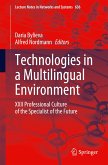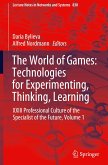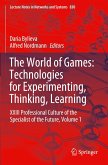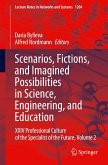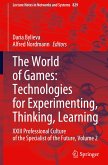Technology, Innovation and Creativity in Digital Society
XXI Professional Culture of the Specialist of the Future
Herausgegeben:Bylieva, Daria; Nordmann, Alfred
Technology, Innovation and Creativity in Digital Society
XXI Professional Culture of the Specialist of the Future
Herausgegeben:Bylieva, Daria; Nordmann, Alfred
- Gebundenes Buch
- Merkliste
- Auf die Merkliste
- Bewerten Bewerten
- Teilen
- Produkt teilen
- Produkterinnerung
- Produkterinnerung
This book requires an interdisciplinary understanding of creativity, ideal for the formation of a digital public culture. Educating students, young professionals and future engineers is to develop their capacity for creativity. Can creativity be learned? With this question, the relations of technology and art appear in a new light. Especially the notion of "progress" takes on a new meaning and must be distinguished from innovation. The discussion of particular educational approaches, the exploration of digital technologies and the presentation of best practice examples conclude the book.…mehr
Andere Kunden interessierten sich auch für
![Technology, Innovation and Creativity in Digital Society Technology, Innovation and Creativity in Digital Society]() Technology, Innovation and Creativity in Digital Society185,99 €
Technology, Innovation and Creativity in Digital Society185,99 €![Technologies in a Multilingual Environment Technologies in a Multilingual Environment]() Technologies in a Multilingual Environment177,99 €
Technologies in a Multilingual Environment177,99 €![The World of Games: Technologies for Experimenting, Thinking, Learning The World of Games: Technologies for Experimenting, Thinking, Learning]() The World of Games: Technologies for Experimenting, Thinking, Learning145,99 €
The World of Games: Technologies for Experimenting, Thinking, Learning145,99 €![The World of Games: Technologies for Experimenting, Thinking, Learning The World of Games: Technologies for Experimenting, Thinking, Learning]() The World of Games: Technologies for Experimenting, Thinking, Learning166,99 €
The World of Games: Technologies for Experimenting, Thinking, Learning166,99 €![The World of Games: Technologies for Experimenting, Thinking, Learning The World of Games: Technologies for Experimenting, Thinking, Learning]() The World of Games: Technologies for Experimenting, Thinking, Learning161,99 €
The World of Games: Technologies for Experimenting, Thinking, Learning161,99 €![Scenarios, Fictions, and Imagined Possibilities in Science, Engineering, and Education Scenarios, Fictions, and Imagined Possibilities in Science, Engineering, and Education]() Scenarios, Fictions, and Imagined Possibilities in Science, Engineering, and Education161,99 €
Scenarios, Fictions, and Imagined Possibilities in Science, Engineering, and Education161,99 €![The World of Games: Technologies for Experimenting, Thinking, Learning The World of Games: Technologies for Experimenting, Thinking, Learning]() The World of Games: Technologies for Experimenting, Thinking, Learning161,99 €
The World of Games: Technologies for Experimenting, Thinking, Learning161,99 €-
-
-
This book requires an interdisciplinary understanding of creativity, ideal for the formation of a digital public culture. Educating students, young professionals and future engineers is to develop their capacity for creativity. Can creativity be learned? With this question, the relations of technology and art appear in a new light. Especially the notion of "progress" takes on a new meaning and must be distinguished from innovation. The discussion of particular educational approaches, the exploration of digital technologies and the presentation of best practice examples conclude the book. University teachers show how the teaching of creativity reinforces the teaching of other subjects, especially foreign languages.
Produktdetails
- Produktdetails
- Lecture Notes in Networks and Systems 345
- Verlag: Springer / Springer International Publishing / Springer, Berlin
- Artikelnr. des Verlages: 978-3-030-89707-9
- 1st edition 2022
- Seitenzahl: 1020
- Erscheinungstermin: 26. Oktober 2021
- Englisch
- Abmessung: 241mm x 160mm x 60mm
- Gewicht: 1671g
- ISBN-13: 9783030897079
- ISBN-10: 3030897079
- Artikelnr.: 62588728
- Herstellerkennzeichnung Die Herstellerinformationen sind derzeit nicht verfügbar.
- Lecture Notes in Networks and Systems 345
- Verlag: Springer / Springer International Publishing / Springer, Berlin
- Artikelnr. des Verlages: 978-3-030-89707-9
- 1st edition 2022
- Seitenzahl: 1020
- Erscheinungstermin: 26. Oktober 2021
- Englisch
- Abmessung: 241mm x 160mm x 60mm
- Gewicht: 1671g
- ISBN-13: 9783030897079
- ISBN-10: 3030897079
- Artikelnr.: 62588728
- Herstellerkennzeichnung Die Herstellerinformationen sind derzeit nicht verfügbar.
Dimensions of Creativity.- Creativity in Engineering - Classics of Modern Dialectical Philosophy Revisited.- Work Engagement - Gateway to Creativity.- Cosmos and Metacosmos in Dessauer's philosophy of technology: The invention of environment.- Creativity as a Technology.- Talent as a Personality Resource of People with Schizotypal Personality.- Epistemic Foraging and the Creative Process: Crawling over Creation.- Creativity and its Genetic Foundations.- Images of Giftedness and Creativity.- Towards Creation: Sergius Bulgakov And Pavel Florensky On The Relationship Between Scientific And Religious Experience.- Technical and Religious: Concepts and Contemporary Social Practices.- The Omnibenevolence Paradox and the Education Paradox: An Amendment to G. W. Leibniz's Theodicy.- Creativity in Technosociety.- The Concept of Utility: the Role of Utilitarianism in Formation of A Technological Worldview.- Digital Technologies of the Self: InstrumentalRationality or Creative Integrity?.- National Judicial Bodies in Search of a Balance of Public and Private Interests.- Remote Work as a Societal Incentive for Creativity: Phygital Initiative for Self-actualization.- The Creative Factor in the Competition between Human and Artificial Intelligence: A Challenge for Labor Law.- Legal Aspects of Artificial Intelligence Application in Artistic Activity.- Creative Solutions and Professional Culture of Prison Staff.- Pressure of Digital Technologies and Students' Creative Thinking in the Educational System.- Information and Communicative Environment for the Development of Student Creativity and Flexible Skills.- Cultivating Creativity Case: Higher Education in Finland Professional .- "Without Electricity/Gravity..." Generating Ideas about the Fate of Civilization.- Green Universities in Orange Economy: New Campus Policy.- A Creative Approach to Creating a Livable Urban Environment.- Mental Maps as a Creative Tool of Marketing Analysis in Education.- Creative Interventions in Corporate Museums and the Transformation of a Company's Communication Space.- Ways to Solve the Problems of Employer-Sponsored Education.- Transcreation as a Creative Tool of Translation.- Specialized Periodicals in the Science and Technology Transfer System of Germany and the USSR in 1920-1930s.- Creativity and media culture in modern Kazakhstan.- Art and Technology.- "Progress" in Art in Terms of Semiotic Theory of Creativity.- Transformation of "Alien" Text as a Technology for Generating the New in Russian Drama of the 1990s - 2010s.- Composition and Symmetries in Computational Analysis of the Fine-Art Aesthetics.- Methodological Procedures of the Russian Avant-garde Art and Their Use in the Modern Practice of the Costume Designer.- Quantum fashion as a new technology in costume design.- Movement Technology: from Kinetic Art to Digital Art.- Role of Digital Technologies in the Conceptual Transforming Foundations of Artistic Creativity.- Analysis of Human Behavior as a Condition for Creative Artificial Storytelling.- Artistic Virtual Reality.- Computer Modeling in Musical Creativity: Example of Interdisciplinary Research.- Computer Technologies as Creative Interaction Tools between Far East and Chinese Musical Cultures.- nalysis of the Emotional Connotations in Russian Language Text.- Creativity And Emotions in the Digital World.- Integrated Use of Data Mining Techniques for Personality Structure Analysis.- Creativity in education.- Educational Technologies for the Development of Creative Thinking of the Future Engineer.- Cultivating Creativity of Technically-Minded Students.- Creative Projects as a Link between Theory and Practice .- Metacognitive Strategies of Social Intelligence and Creativity through Digital Communication Tools.- An Interdisciplinary Approach to Training Teaching Skills for Intercultural Communicative Competence .- The Issue of Adaptive Learning as EducationalInnovation.- Technical University Students' Creativity Development in Competency-based Foreign Language Classes.- Pedagogical Creativity vs Academic Dishonesty in Teaching University Mathematics.- Cheating and Plagiarism among University Students: Ways of Solving the Problem.- Students' Preferences in Choosing the Form and Means of Interaction with Professors: Innovation or Tradition?.- A Medical University School of Pedagogical Excellence as the Environment for Creativity .- Cross-Disciplinary Code Switching as Means of Encouraging Creativity.- Information Technologies for the Training of Teachers in the Creative Professions .- Challenges of Induction: The Difference between Novice University Teachers with and without Pedagogical Training.- The Experience of Developing Creativity in Future Primary School Teachers.- Forming the Basics of Foreign Language Teachers' Methodological Creativity during Linguistic Training at a University.- Digital Creative Projects in the Formation of Digital Competence of Teachers of English as a Foreign Language.- The Formation of Analytic Abilities for Coaching Rhythmic Gymnastics.- The Formation of the Creative Teacher's Personality in the Context of Modern Education.- The Indonesian Customs and Excise Training Center during the COVID-19 pandemic: An innovative System of Educational Process Management.- Best Practice Models.- Technology-based Methods for Creative Teaching and Learning of Foreign Languages.- Methods of Achieving Successful Professional Communication from the Perspective of Intercultural Communication.- Study of the Efficiency of a Multilingual Educational Model.- Video Sketches as the Means to Improve Students' Creativity in Studying Foreign Languages.- Digital Pedagogical Cues for the Development of Creativity in High School.- Mind Mapping Method in Foreign Language Education: Transformative Effects of a Productive Approach.- The Development of Creative Thinking in Engineering Students through Web-related Language Learning.- The Formation of Translation Competence in the Process of Engineering Education.- Evaluating the Capacity of Foreign Language Speaking Tasks to Stimulate Creativity.- Using a Creative Approach to Teach Russian as a Foreign Language to International Students Majoring in "Music Education".- The Use of Literary Works for Stimulating Students' Creativity.- Corpus Linguistic Technology as a Tool to Improve Creative Thinking in the Interpretation of English Language Idioms.- The Influence of Digital Transformations on Learners' and Educators' Creativity.- Infographics as a Creative Design Method for Foreign Language Teaching.
Dimensions of Creativity.- Creativity in Engineering - Classics of Modern Dialectical Philosophy Revisited.- Work Engagement - Gateway to Creativity.- Cosmos and Metacosmos in Dessauer's philosophy of technology: The invention of environment.- Creativity as a Technology.- Talent as a Personality Resource of People with Schizotypal Personality.- Epistemic Foraging and the Creative Process: Crawling over Creation.- Creativity and its Genetic Foundations.- Images of Giftedness and Creativity.- Towards Creation: Sergius Bulgakov And Pavel Florensky On The Relationship Between Scientific And Religious Experience.- Technical and Religious: Concepts and Contemporary Social Practices.- The Omnibenevolence Paradox and the Education Paradox: An Amendment to G. W. Leibniz's Theodicy.- Creativity in Technosociety.- The Concept of Utility: the Role of Utilitarianism in Formation of A Technological Worldview.- Digital Technologies of the Self: InstrumentalRationality or Creative Integrity?.- National Judicial Bodies in Search of a Balance of Public and Private Interests.- Remote Work as a Societal Incentive for Creativity: Phygital Initiative for Self-actualization.- The Creative Factor in the Competition between Human and Artificial Intelligence: A Challenge for Labor Law.- Legal Aspects of Artificial Intelligence Application in Artistic Activity.- Creative Solutions and Professional Culture of Prison Staff.- Pressure of Digital Technologies and Students' Creative Thinking in the Educational System.- Information and Communicative Environment for the Development of Student Creativity and Flexible Skills.- Cultivating Creativity Case: Higher Education in Finland Professional .- "Without Electricity/Gravity..." Generating Ideas about the Fate of Civilization.- Green Universities in Orange Economy: New Campus Policy.- A Creative Approach to Creating a Livable Urban Environment.- Mental Maps as a Creative Tool of Marketing Analysis in Education.- Creative Interventions in Corporate Museums and the Transformation of a Company's Communication Space.- Ways to Solve the Problems of Employer-Sponsored Education.- Transcreation as a Creative Tool of Translation.- Specialized Periodicals in the Science and Technology Transfer System of Germany and the USSR in 1920-1930s.- Creativity and media culture in modern Kazakhstan.- Art and Technology.- "Progress" in Art in Terms of Semiotic Theory of Creativity.- Transformation of "Alien" Text as a Technology for Generating the New in Russian Drama of the 1990s - 2010s.- Composition and Symmetries in Computational Analysis of the Fine-Art Aesthetics.- Methodological Procedures of the Russian Avant-garde Art and Their Use in the Modern Practice of the Costume Designer.- Quantum fashion as a new technology in costume design.- Movement Technology: from Kinetic Art to Digital Art.- Role of Digital Technologies in the Conceptual Transforming Foundations of Artistic Creativity.- Analysis of Human Behavior as a Condition for Creative Artificial Storytelling.- Artistic Virtual Reality.- Computer Modeling in Musical Creativity: Example of Interdisciplinary Research.- Computer Technologies as Creative Interaction Tools between Far East and Chinese Musical Cultures.- nalysis of the Emotional Connotations in Russian Language Text.- Creativity And Emotions in the Digital World.- Integrated Use of Data Mining Techniques for Personality Structure Analysis.- Creativity in education.- Educational Technologies for the Development of Creative Thinking of the Future Engineer.- Cultivating Creativity of Technically-Minded Students.- Creative Projects as a Link between Theory and Practice .- Metacognitive Strategies of Social Intelligence and Creativity through Digital Communication Tools.- An Interdisciplinary Approach to Training Teaching Skills for Intercultural Communicative Competence .- The Issue of Adaptive Learning as EducationalInnovation.- Technical University Students' Creativity Development in Competency-based Foreign Language Classes.- Pedagogical Creativity vs Academic Dishonesty in Teaching University Mathematics.- Cheating and Plagiarism among University Students: Ways of Solving the Problem.- Students' Preferences in Choosing the Form and Means of Interaction with Professors: Innovation or Tradition?.- A Medical University School of Pedagogical Excellence as the Environment for Creativity .- Cross-Disciplinary Code Switching as Means of Encouraging Creativity.- Information Technologies for the Training of Teachers in the Creative Professions .- Challenges of Induction: The Difference between Novice University Teachers with and without Pedagogical Training.- The Experience of Developing Creativity in Future Primary School Teachers.- Forming the Basics of Foreign Language Teachers' Methodological Creativity during Linguistic Training at a University.- Digital Creative Projects in the Formation of Digital Competence of Teachers of English as a Foreign Language.- The Formation of Analytic Abilities for Coaching Rhythmic Gymnastics.- The Formation of the Creative Teacher's Personality in the Context of Modern Education.- The Indonesian Customs and Excise Training Center during the COVID-19 pandemic: An innovative System of Educational Process Management.- Best Practice Models.- Technology-based Methods for Creative Teaching and Learning of Foreign Languages.- Methods of Achieving Successful Professional Communication from the Perspective of Intercultural Communication.- Study of the Efficiency of a Multilingual Educational Model.- Video Sketches as the Means to Improve Students' Creativity in Studying Foreign Languages.- Digital Pedagogical Cues for the Development of Creativity in High School.- Mind Mapping Method in Foreign Language Education: Transformative Effects of a Productive Approach.- The Development of Creative Thinking in Engineering Students through Web-related Language Learning.- The Formation of Translation Competence in the Process of Engineering Education.- Evaluating the Capacity of Foreign Language Speaking Tasks to Stimulate Creativity.- Using a Creative Approach to Teach Russian as a Foreign Language to International Students Majoring in "Music Education".- The Use of Literary Works for Stimulating Students' Creativity.- Corpus Linguistic Technology as a Tool to Improve Creative Thinking in the Interpretation of English Language Idioms.- The Influence of Digital Transformations on Learners' and Educators' Creativity.- Infographics as a Creative Design Method for Foreign Language Teaching.

